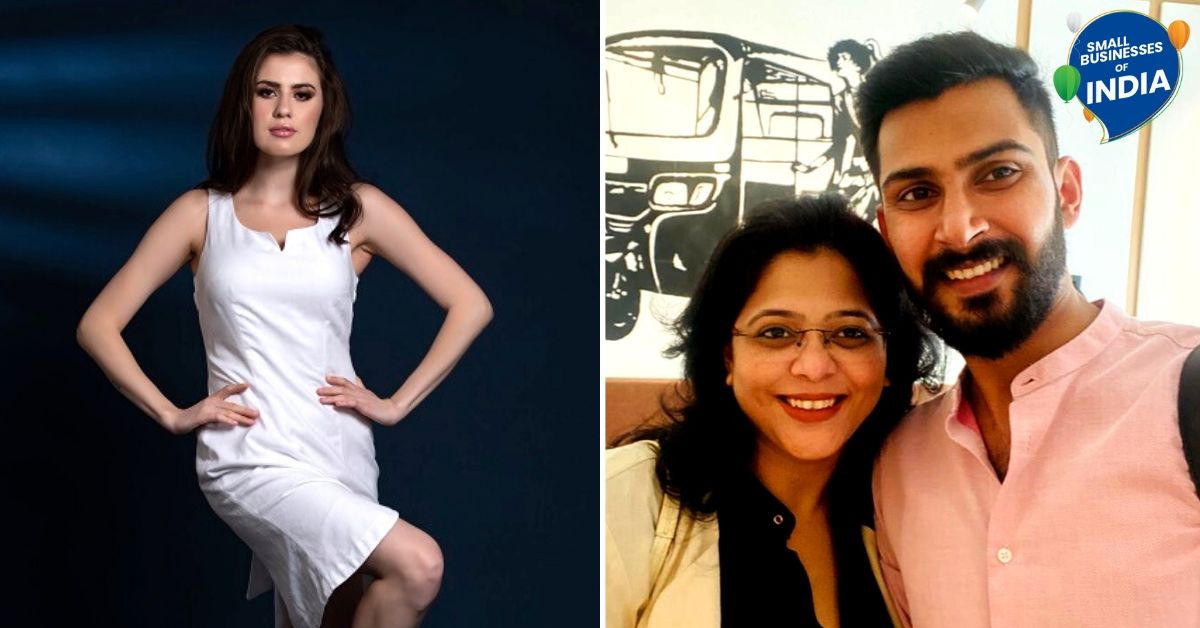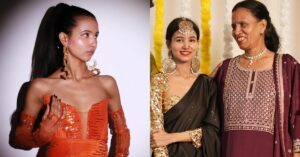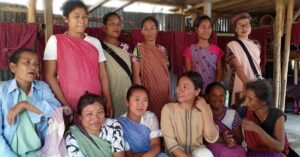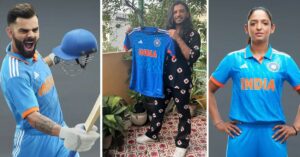Gurugram Duo Makes 100% Organic Clothes That Decompose in 180 Days When Discarded
The innovative clothes involve some walnuts and veggies too. Guess where they are used?

Open your wardrobe and have a hard look at your favourite pieces of clothing. Have they been mass-produced? Did you get them in a flash sale? Who stitched your clothes, and most importantly, where do these favourite pieces end up when you are finally done using them? Would you be okay with your choices if you knew that they hurt others as well as the planet?
Entrepreneurs Hitesha Deshpande and Himanshu Kulhari began thinking about these problems when starting their clothing brand.
“We both love animals and decided to have an animal-themed clothing line, and started studying the industry,” recalls Hitesha.
The cost of fast fashion
On digging deeper in the glitzy fashion industry, she learnt about the hidden costs that often go unnoticed.
“We found that brands that mass produce their designs use chemicals that pollute the environment. Also, a lot of fast fashion brands don’t even pay the minimum wages to their workers,” says Hitesha.
Reports state that almost 700 gallons of water are required to produce one t-shirt! Additionally, textile dyeing is the second-largest polluter of water. Thirty-five per cent of all microplastics that never decompose, float in marine waters and can be traced back to synthetic fabrics like polyester. Also, every year, 21 billion tons of textiles end up in landfills.
Moreover, a lot of fast fashion brands produce designs in bulk, and hence, outsource all their work to garment hubs (mostly third-world countries like Bangladesh and India) where labour is deemed ‘cheap’. These workers are not only paid less than their due but also work in unsafe conditions that even result in disasters.
Understanding these problems led the duo to found PECKD in 2018. The conscious fashion brand makes clothes using fabric sourced from weaver clusters in the Sundarbans. They use natural fabrics like silk and cotton to transform their timeless designs into beautiful garments.
“Our fabric is not dyed. Meaning, we only have outfits in white. This is because we still haven’t figured an eco-friendly way of dyeing our garments,” shares Hitesha.
Every detail in their garment is compostable, starting from the thread to the buttons, which are made from compressed walnuts and dehydrated vegetables. And when the garment has reached the end of its life, you just need to bury it in moist soil and it decomposes in 180 days!
The 100 per cent organic clothing brand has customers from the US, UK, Dubai, and Norway, in addition to India. Even the packaging is eco-friendly, with the cloth tags made from seed paper (basil, marigold, and lavender)!
The entrepreneurial journey
Although Hitesha’s career path has been about entrepreneurship, she never studied to be one. She studied psychology and even started a communications design company.
In 2007, she was diagnosed with ovarian cancer. While undergoing treatment and recuperating, she kept herself busy and motivated by writing. The entrepreneurial spirit urged her to start two companies, where she also met Himanshu, who helped found PECKD in mid-2018.
She also founded ‘Finding ENKI’ in 2018, a brand communication agency, where she met Himanshu, who joined as a creative head. Himanshu was born in Churu and finished his Computer Science Engineering degree from Jaipur in 2016.
When he joined Finding ENKI, mutual interests with Hitesha facilitated conversations that finally led to the founding of PECKD in mid-2018.
Keeping it 100% compostable
Although PECKD was founded in 2018, it was only in 2019 that they started selling their products online in their quest to come up with a fully compostable garment.
This meant putting careful thought into each component of the garment. Once they sourced the fabric, they focused on finding the right thread. “Most of the thread used in the garment industry is made from polyester as it is more sturdy. But we wanted to stay true to our core values,” she says.

Finally, they did find a manufacturer who made a sturdier organic thread but the machine needle would keep breaking. They ended up customising the needle as well. Even in the case of buttons, instead of using coir or wood, they sourced dehydrated vegetables and compressed walnuts from a vendor.
None of the garments have any rubber elastic or metal zippers. So, going about designing the outfits such that that these weren’t required, was challenging. PECKD has an in-house designer along with Hitesha and Himanshu.
Once the designs are finalised, they are stitched by two master tailors and four others in their design studio in Gurugram. As of now, they have the ‘Delta and Dawn’ collection launched in October 2019. Interestingly, the collection was named after two humpback whales.
“We decided to name our collections on indigenous species. Each of the pieces in this collection is named after a whale that has been rescued and lives in a sanctuary,” she says.
The idea was to start a conversation and spread awareness for their love of animals, informs Hitesha.
Having strong core values has helped the eco-conscious clothing brand impress takers. Gurugram-based Piya Sethi is one. The 35-year-old cabin crew member at a leading international airline was looking for sustainable fashion brands online when she came across PECKD.
“With so much happening around the world in terms of climate change and natural disasters, I wanted to do my bit by making conscious choices,” says Piya.
She decided to speak to Hitesha and find out more before making a purchase.
“I was initially skeptical if the dress would fit well but I was wrong. Not only is the fit perfect but the fabric feels very soft and smooth. The style is also timeless, and I feel good about supporting a small business that has ethical values,” she says.
Overcoming hurdles for a sustainable future

Although PECKD is steadily carving its niche, many hurdles come in their path.
“Often, people do not understand the meaning of compostable because I’ve been asked many times if the clothing will disintegrate after a few uses. Another challenge is bringing down the costs of the pieces, which is only possible when there is a considerable demand,” explains Hitesha.
Exploring solutions to these issues in her entrepreneurial journey, Hitesha shares words of encouragement for other business owners.
“You will be tempted to give up on your journey because there will be a lot of challenges. But if you truly believe the concept, then stick to it. We came close to giving up, but it was very important to keep going. Because, if you lose momentum, you lose it all. So, never give up,” she says.
As a bootstrapped business, the duo was looking forward to scaling their operations and breaking even in the first eight months of this year. However, the pandemic has put their plans on hold. Currently, they are working on their next collection, ‘Frilled Dragon’, a species of lizard, endemic to Australia. They are also working on launching their men’s collection and experimenting with natural dyes.
“Fashion should not take away from the planet. We hope that more brands come up because we are all working towards the same goal of consciousness. More awareness and sensitivity in promoting eco-conscious fashion means it could become the norm one day,” she says.
Rapid-fire:
*An entrepreneur you admire.
Ans: Henry Ford
*New tech that can transform the future of small businesses
Ans: Digitisation of commerce because it saves cost phenomenally
*One value that can help small businesses thrive
Ans: Persistence
*Your favourite book
Ans: The Book Thief by Markus Zusak
*In my free time, I ____…
Ans: write fantasy fiction
* Before this interview, I was ____…
Ans: in a meeting
* A message for your past self about small businesses
Ans: That it is okay to make mistakes
*Something they don’t teach in college but is important to run a business
Ans: Trusting one’s instincts
*Best advice you ever got is to ____…
Ans: follow my heart.
(Edited by Shruti Singhal)
Like this story? Or have something to share?
Write to us: [email protected]
Connect with us on Facebook and Twitter.
This story made me
- 97
- 121
- 89
- 167
Tell Us More
We bring stories straight from the heart of India, to inspire millions and create a wave of impact. Our positive movement is growing bigger everyday, and we would love for you to join it.
Please contribute whatever you can, every little penny helps our team in bringing you more stories that support dreams and spread hope.



















